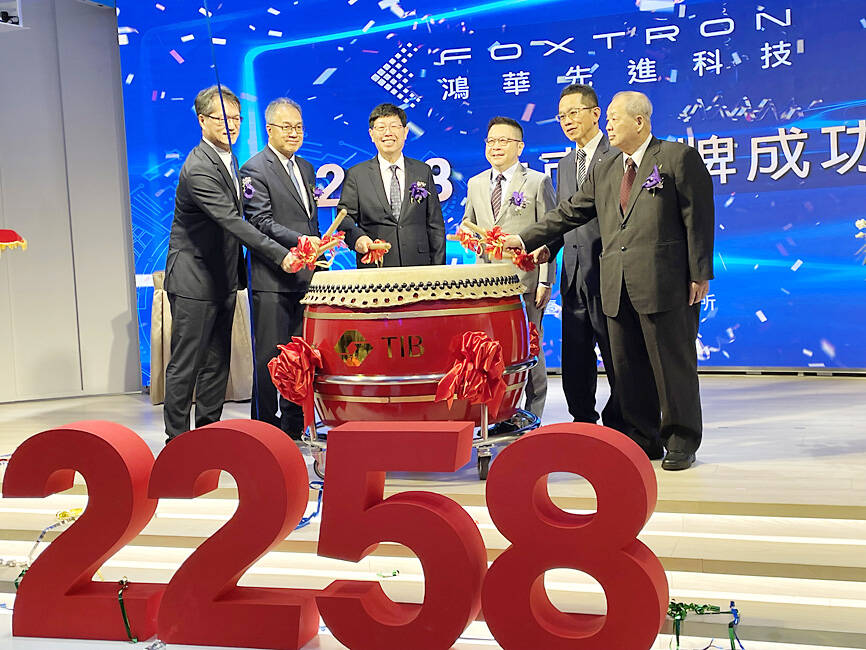Shares of Foxtron Vehicle Technologies Co (鴻華先進), an electric vehicle joint venture between Hon Hai Precision Industry Co (鴻海精密) and Yulon Motor Co (裕隆汽車), yesterday fell 2.7 percent on their debut on the Taiwan Stock Exchange’s (TWSE) new trading platform — the Taiwan Innovation Board.
Foxtron is the 1,000th listed company on the nation’s main bourse and the eighth firm trading shares on the Innovation Board, TWSE said in a statement.
The stock dropped at the open from its initial public offering price of NT$50, and at one point fell to as low as NT$45.5, before paring some losses to close 2.7 percent lower at NT$48.65, underperforming the TAIEX’s 0.01 percent rise.

Photo: CNA
Established in 2020 with paid-in capital of NT$17.41 billion (US$549.94 million), Foxtron is 49.92 percent owned by Hon Hai and 47.96 percent held by Yulon subsidiary Hua-Chuang Automobile Information Technical Center Co (華創車電), with the remainder held by other investors.
Over the past three years, the company has developed four electric vehicle (EV) prototypes: the Model B crossover sports utility vehicle, Model C sports utility vehicle, Model E luxury sedan and the Model T bus.
Unique Satellite TV quoted Foxtron CEO Andy Lee (李秉彥) as saying at yesterday’s listing ceremony that the company is starting production of the Model C this quarter and expects to begin deliveries of the model in January next year.
Foxtron hopes to complete the delivery of 8,000 to 9,000 vehicles in the first half of next year, the company said.
The Model B is expected to start volume production in the fourth quarter of next year, while the delivery of Model T buses would exceed 100 units this year, up from 20 to 30 last year, it said.
“Compared with traditional automakers, which often spend five to six years from design to mass production, Foxtron has built four EV models in less than three years, at a faster speed to popularize electric cars in Taiwan and better serve local customers,” Foxtron chairman Young Liu (劉揚偉) said at the listing ceremony yesterday.
Liu is also chairman of Hon Hai, a major Apple Inc supplier known internationally as Foxconn Technology Group (富士康科技集團).
Liu touted Foxtron’s advantages in speed, quality and cost efficiency in vehicle production, but said that “complete vehicle design” is the biggest challenge for the firm. “We would continue on this path,” he said.
Liu said Foxtron would use Taiwan as its production base and leverage Hon Hai’s “contract design and manufacturing service” (CDMS) and “build operate localize” (BOL) business models to enter mainstream markets such as North America and Southeast Asia, with electric passenger cars expected for North America initially and electric buses for Southeast Asia.
Foxtron lost NT$895 million in the first three quarters of this year, more than doubling its losses from NT$396 million a year earlier, with losses per share of NT$0.56. The company posted losses per share of NT$0.87 last year and NT$0.51 in 2021.
Cumulative sales in the first 10 months of the year rose 196.15 percent year-on-year to NT$764.7 million, company data showed.

TARIFFS: The global ‘panic atmosphere remains strong,’ and foreign investors have continued to sell their holdings since the start of the year, the Ministry of Finance said The government yesterday authorized the activation of its NT$500 billion (US$15.15 billion) National Stabilization Fund (NSF) to prop up the local stock market after two days of sharp falls in reaction to US President Donald Trump’s new import tariffs. The Ministry of Finance said in a statement after the market close that the steering committee of the fund had been given the go-ahead to intervene in the market to bolster Taiwanese shares in a time of crisis. The fund has been authorized to use its assets “to carry out market stabilization tasks as appropriate to maintain the stability of Taiwan’s

STEEP DECLINE: Yesterday’s drop was the third-steepest in its history, the steepest being Monday’s drop in the wake of the tariff announcement on Wednesday last week Taiwanese stocks continued their heavy sell-off yesterday, as concerns over US tariffs and unwinding of leveraged bets weighed on the market. The benchmark TAIEX plunged 1,068.19 points, or 5.79 percent, to 17,391.76, notching the biggest drop among Asian peers as it hit a 15-month low. The decline came even after the government on late Tuesday authorized the NT$500 billion (US$15.2 billion) National Stabilization Fund (國安基金) to step in to buoy the market amid investors’ worries over tariffs imposed by US President Donald Trump. Yesterday’s decline was the third-steepest in its history, trailing only the declines of 2,065.87 points on Monday and

TARIFF CONCERNS: The chipmaker cited global uncertainty from US tariffs and a weakening economic outlook, but said its Singapore expansion remains on track Vanguard International Semiconductor Corp (世界先進), a foundry service provider specializing in producing power management and display driver chips, yesterday withdrew its full-year revenue projection of moderate growth for this year, as escalating US tariff tensions raised uncertainty and concern about a potential economic recession. The Hsinchu-based chipmaker in February said revenues this year would grow mildly from last year based on improving supply chain inventory levels and market demand. At the time, it also anticipated gradual quarter revenue growth. However, the US’ sweeping tariff policy has upended the industry’s supply chains and weakened economic prospects for the world economy, it said. “Now

An employment discrimination lawsuit against contract chipmaker Taiwan Semiconductor Manufacturing Co (TSMC, 台積電) might soon be expanded after a hearing in a federal court in San Jose, California, on Tuesday to add 15 plaintiffs to the case. According to a court document, the lawsuit, which was refiled in November last year as a form of a class action with 13 plaintiffs in California, wants to add 15 plaintiffs from Arizona, where TSMC is building up its wafer fab capacity. TSMC first committed between 2020 and last year to invest US$65 billion in three advanced wafer fabs in Arizona. It then pledged an